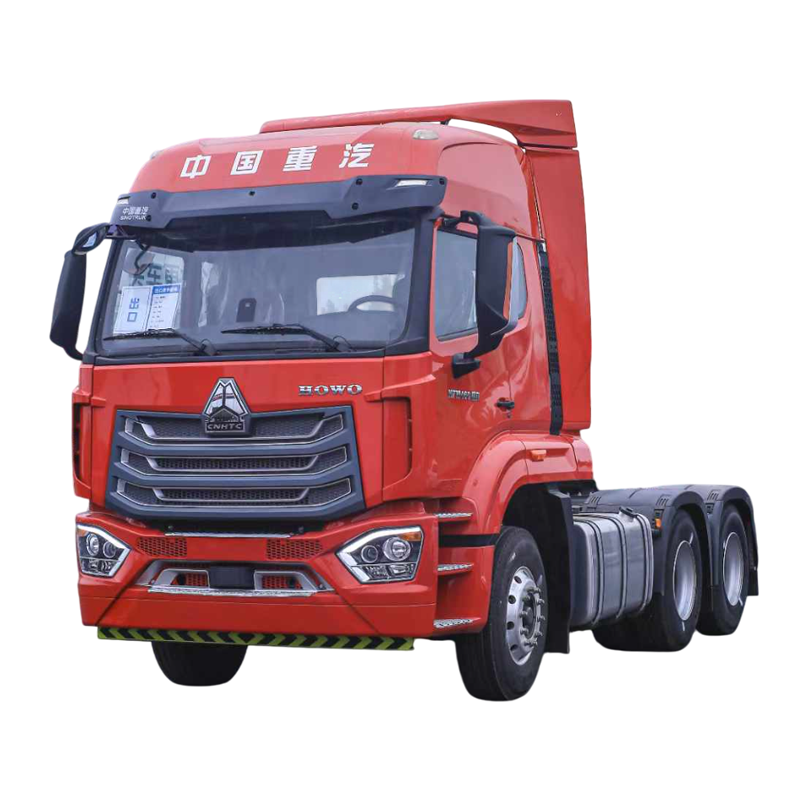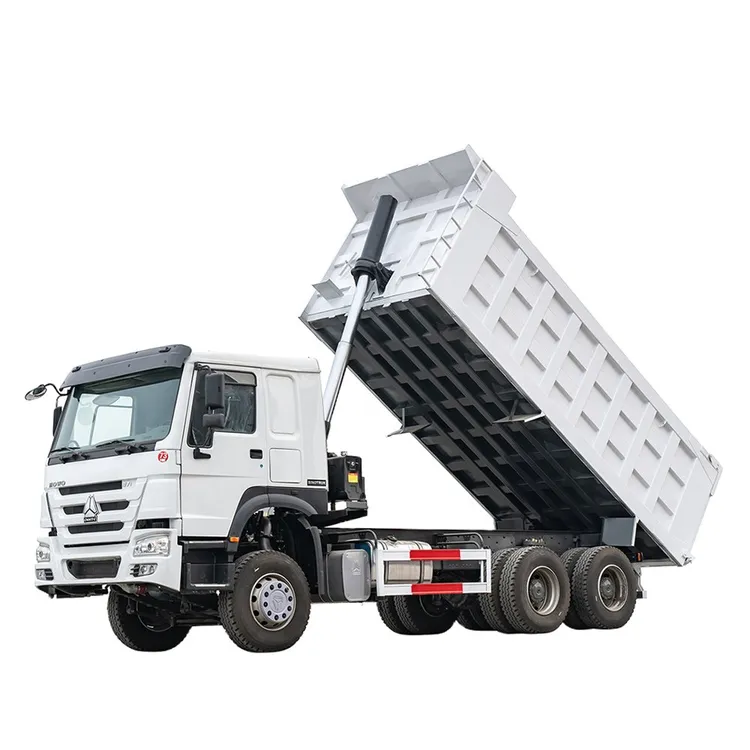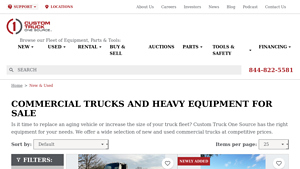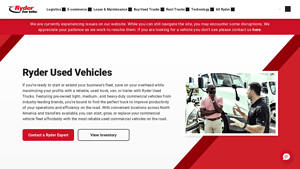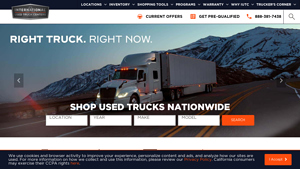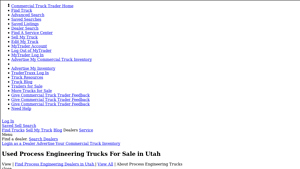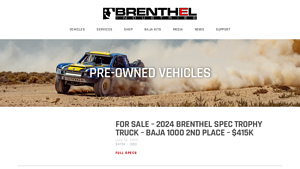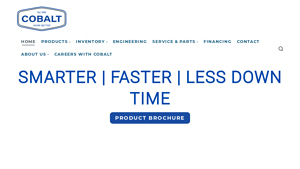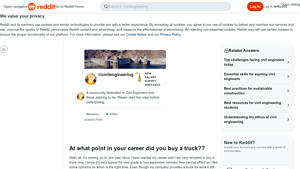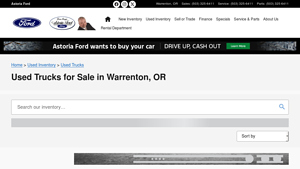Introduction: Navigating the Global Market for used Engineering Truck
Navigating the complex landscape of sourcing used engineering trucks can present a formidable challenge for international B2B buyers, particularly in diverse markets such as Africa, South America, the Middle East, and Europe. The need for reliable, cost-effective vehicles that meet industry standards while also accommodating budget constraints is paramount. This guide aims to equip you with the essential knowledge to make informed purchasing decisions by exploring various types of used engineering trucks, their applications across different sectors, and crucial supplier vetting practices.
Within these pages, you will find insights into the diverse range of used engineering trucks available, including specifications, performance metrics, and operational advantages. We will also delve into the financial aspects of acquiring used vehicles, highlighting cost-saving strategies and financing options that can enhance your purchasing power. Additionally, understanding the intricacies of supplier evaluation is critical; this guide will offer criteria to identify reputable dealers and assess their inventory effectively.
By leveraging this comprehensive resource, B2B buyers from Brazil to Germany can navigate the global market with confidence. The insights provided will not only streamline your procurement process but also empower you to select the right used engineering trucks that align with your operational needs and strategic goals, ensuring that your business remains competitive in an ever-evolving landscape.
Understanding used Engineering Truck Types and Variations
| Type Name | Key Distinguishing Features | Primary B2B Applications | Brief Pros & Cons for Buyers |
|---|---|---|---|
| Dump Trucks | Open-box design, hydraulic lift system | Construction, waste management | Pros: High load capacity, versatile. Cons: Maintenance can be costly. |
| Boom Trucks | Extendable arm for lifting heavy loads | Telecommunications, construction | Pros: Great for accessing hard-to-reach areas. Cons: Can be expensive to maintain. |
| Service/Utility Trucks | Versatile, equipped with tools and storage | Utilities, maintenance services | Pros: Multi-functional, efficient. Cons: Limited cargo space compared to larger trucks. |
| Bucket Trucks | Elevated platform for aerial work | Tree trimming, electrical services | Pros: Safe access to heights, easy to operate. Cons: Limited to specific tasks. |
| Refrigerated Trucks | Insulated cargo area for temperature-sensitive goods | Food transport, pharmaceuticals | Pros: Essential for perishable goods. Cons: Higher operational costs. |
What are the Key Characteristics of Dump Trucks?
Dump trucks are designed with an open-box configuration and a hydraulic lift system that allows for easy unloading of materials. They are commonly used in construction and waste management industries, making them crucial for transporting heavy loads such as gravel, sand, and debris. When considering a dump truck, buyers should evaluate the truck’s load capacity, hydraulic system reliability, and overall condition. While they offer high versatility, potential buyers must also be aware of maintenance costs associated with hydraulic systems.
How Do Boom Trucks Serve Various Industries?
Boom trucks are equipped with an extendable arm, enabling them to lift and position heavy loads at significant heights. They are particularly useful in telecommunications and construction, where reaching elevated areas is necessary for installations and repairs. Buyers should assess the boom’s reach and load capacity, as well as the truck’s overall mechanical condition. Although they provide exceptional access to hard-to-reach locations, the maintenance costs can be high due to the complexity of the lifting mechanisms.
Why Choose Service/Utility Trucks for Your Operations?
Service or utility trucks are designed to be versatile, often featuring built-in storage and tools for field maintenance. They are predominantly used in utility sectors and maintenance services, where quick access to tools and materials is essential. When purchasing a service truck, businesses should consider the layout of storage compartments and the truck’s overall weight capacity. While these trucks are efficient and functional, they may offer limited cargo space compared to larger models.
What Makes Bucket Trucks Ideal for Aerial Work?
Bucket trucks are specialized vehicles equipped with an elevated platform that allows workers to perform tasks at height safely. They are widely used in tree trimming and electrical service industries. Buyers should look for features such as platform height and stability when evaluating options. While bucket trucks provide safe access to elevated areas, their functionality is often limited to specific tasks, which may not justify the investment for all companies.
How Do Refrigerated Trucks Meet Specific Transport Needs?
Refrigerated trucks, or reefer trucks, are designed with insulated cargo areas to transport temperature-sensitive goods. They are essential for industries like food transport and pharmaceuticals, where maintaining specific temperature ranges is critical. Buyers should evaluate the truck’s refrigeration unit efficiency and cargo capacity. Although they are indispensable for transporting perishables, operational costs can be higher due to fuel and maintenance of refrigeration systems.
Key Industrial Applications of used Engineering Truck
| Industry/Sector | Specific Application of used Engineering Truck | Value/Benefit for the Business | Key Sourcing Considerations for this Application |
|---|---|---|---|
| Construction | Transporting heavy materials and equipment | Enhances efficiency in project timelines and cost savings | Assess load capacity, vehicle condition, and maintenance history |
| Oil and Gas | Servicing remote drilling sites | Increases operational reach and reduces downtime | Check for off-road capabilities and fuel efficiency |
| Telecommunications | Installing and maintaining communication towers | Supports infrastructure development and service reliability | Evaluate truck height and reach capabilities |
| Forestry | Hauling timber and managing forest resources | Improves logistics and reduces transportation costs | Consider truck durability and specialized attachments |
| Waste Management | Collecting and transporting waste materials | Streamlines waste disposal processes and enhances compliance | Look for trucks with adequate payload and specialized equipment |
How Are Used Engineering Trucks Utilized in the Construction Sector?
In the construction industry, used engineering trucks play a pivotal role in transporting heavy materials, tools, and equipment to various job sites. These trucks are essential for moving concrete, steel, and other building supplies efficiently, thereby enhancing project timelines and reducing costs. Buyers in this sector should prioritize trucks with robust load capacities, well-documented maintenance histories, and reliable performance to ensure minimal downtime and maximum productivity.
What Are the Applications of Used Engineering Trucks in the Oil and Gas Industry?
Used engineering trucks are critical for the oil and gas sector, particularly for servicing remote drilling sites. These trucks facilitate the transportation of equipment and personnel to locations that may be difficult to access. Businesses benefit from increased operational reach and reduced downtime, which are vital in this highly competitive industry. Buyers should consider trucks with off-road capabilities and fuel efficiency to navigate challenging terrains effectively.
How Do Used Engineering Trucks Support Telecommunications Infrastructure?
In telecommunications, used engineering trucks are employed for the installation and maintenance of communication towers. These vehicles are equipped to carry necessary tools and equipment, ensuring that service reliability is maintained. The value lies in supporting infrastructure development, which is crucial for expanding network coverage. Prospective buyers should evaluate the height and reach capabilities of the trucks to ensure they meet specific project requirements.
Why Are Used Engineering Trucks Important for the Forestry Sector?
Forestry operations utilize used engineering trucks for hauling timber and managing forest resources. These trucks enhance logistics by enabling the efficient transport of harvested wood to processing facilities, which can significantly reduce transportation costs. Buyers in this sector should focus on the durability of the trucks and any specialized attachments that may be necessary for handling forestry-specific tasks, such as grapples or chipper mounts.
How Do Used Engineering Trucks Streamline Waste Management Operations?
In waste management, used engineering trucks are essential for collecting and transporting waste materials. These trucks help streamline waste disposal processes, ensuring compliance with environmental regulations. The benefits include improved operational efficiency and cost savings. Buyers should look for vehicles with adequate payload capacities and specialized equipment, such as compaction systems or roll-off containers, to meet the demands of waste collection and transportation effectively.
3 Common User Pain Points for ‘used Engineering Truck’ & Their Solutions
Scenario 1: Difficulty Assessing the Condition of Used Engineering Trucks
The Problem: B2B buyers often struggle to evaluate the true condition of used engineering trucks. This challenge is exacerbated by the lack of comprehensive maintenance records and transparency from sellers. Buyers may face the risk of acquiring vehicles that have hidden defects or significant wear and tear, leading to unexpected repair costs and operational downtimes. This uncertainty can be particularly daunting for businesses in regions like Africa and South America, where access to specialized mechanics and parts may be limited.
The Solution: To effectively assess the condition of used engineering trucks, buyers should implement a thorough inspection process before finalizing any purchase. This includes obtaining a detailed vehicle history report and requiring sellers to provide maintenance records. It is beneficial to enlist a trusted third-party inspector who specializes in heavy machinery. This expert can conduct a comprehensive evaluation, focusing on critical components such as the engine, transmission, and hydraulic systems. Additionally, potential buyers should take the time to physically inspect the truck and test its operational capabilities. By employing these strategies, businesses can significantly reduce the risk of purchasing subpar vehicles and ensure they make informed investment decisions.
Scenario 2: Navigating Complex Regulations for Importing Used Trucks
The Problem: International buyers often encounter complex regulations and compliance requirements when importing used engineering trucks. These regulations can vary widely between countries, creating confusion about necessary documentation, emissions standards, and safety certifications. For businesses in regions like the Middle East and Europe, failing to adhere to these regulations can result in costly delays, fines, and even the inability to use the purchased equipment.
The Solution: To navigate the complexities of importing used engineering trucks, buyers should conduct thorough research on the regulations specific to their destination country. Engaging with a logistics partner or customs broker who specializes in heavy equipment can provide invaluable insights into the required documentation and compliance standards. It’s essential to prepare all necessary paperwork, including proof of ownership, import licenses, and compliance certificates, well in advance. Buyers should also verify that the truck meets local emissions standards before purchase to avoid complications upon arrival. By proactively managing compliance issues, businesses can facilitate a smoother import process and minimize potential disruptions to their operations.
Scenario 3: Limited Access to Financing Options for Used Trucks
The Problem: Many B2B buyers face challenges securing financing for used engineering trucks, particularly in emerging markets. Traditional lenders may be hesitant to finance used equipment due to concerns about resale value and depreciation. This limitation can restrict businesses from expanding their fleets, ultimately affecting their operational capabilities and competitiveness in the market.
The Solution: To overcome financing hurdles, buyers should explore alternative financing options tailored for used trucks. This may include working with specialized equipment financing companies that understand the unique needs of the construction and engineering sectors. Buyers can also consider forming partnerships with manufacturers or dealers that offer financing programs specifically for used equipment, often with more favorable terms. Additionally, establishing a solid credit profile and providing detailed business plans can increase the likelihood of obtaining financing. By actively seeking out diverse financing avenues, businesses can secure the necessary funds to purchase used engineering trucks and sustain their growth initiatives.
Strategic Material Selection Guide for used Engineering Truck
What Are the Key Materials Used in Engineering Trucks?
When selecting used engineering trucks, understanding the materials used in their construction is crucial for ensuring performance, durability, and cost-effectiveness. Here, we analyze four common materials: steel, aluminum, composite materials, and fiberglass. Each material has distinct properties, advantages, and limitations that can significantly impact operational efficiency and maintenance costs.
How Does Steel Contribute to the Performance of Engineering Trucks?
Steel is a widely used material in the construction of engineering trucks due to its high strength and durability. Key properties include excellent tensile strength, temperature resistance, and corrosion resistance when treated with appropriate coatings.
Pros and Cons: Steel’s durability makes it suitable for heavy-duty applications, providing long-lasting performance even under extreme conditions. However, it is heavier than other materials, which can affect fuel efficiency and payload capacity. Additionally, the manufacturing complexity can increase costs, especially if specialized treatments are required for corrosion resistance.
Impact on Application: Steel’s compatibility with various media, including oils and fuels, makes it a reliable choice for engineering trucks used in construction and oil industries.
Considerations for International Buyers: Compliance with international standards such as ASTM and DIN is essential. Buyers in regions like Africa and South America should be aware of local environmental regulations regarding emissions and material disposal.
What Role Does Aluminum Play in Engineering Truck Design?
Aluminum is increasingly favored in engineering trucks for its lightweight properties and resistance to corrosion. It has a lower density than steel, which contributes to improved fuel efficiency and payload capacity.
Pros and Cons: The key advantage of aluminum is its excellent corrosion resistance, making it ideal for trucks operating in humid or coastal environments. However, aluminum is generally more expensive than steel, and its lower tensile strength can be a limitation in heavy-duty applications.
Impact on Application: Aluminum is particularly suitable for applications requiring weight savings, such as in transportation and delivery services. It is also compatible with various media, including water and chemicals, making it versatile.
Considerations for International Buyers: Buyers should ensure that aluminum components meet local standards for strength and durability, particularly in regions like Europe where regulations can be stringent.
How Do Composite Materials Enhance Engineering Truck Functionality?
Composite materials, often a blend of resin and fibers, are becoming popular in engineering trucks for their high strength-to-weight ratio and resistance to corrosion.
Pros and Cons: Composites are lightweight and can be engineered for specific performance characteristics, making them suitable for various applications. However, they can be more expensive to manufacture and may require specialized repair techniques, which can complicate maintenance.
Impact on Application: Composites are particularly effective in applications where weight reduction is critical, such as in specialized vehicles for urban environments. Their resistance to chemicals makes them suitable for transporting hazardous materials.
Considerations for International Buyers: Buyers should verify that composite materials comply with international standards for safety and performance, especially in regions with strict regulations, such as Germany.
What Advantages Does Fiberglass Offer for Engineering Trucks?
Fiberglass is another lightweight material used in engineering trucks, known for its excellent corrosion resistance and flexibility in design.
Pros and Cons: Fiberglass is resistant to a variety of chemicals and environmental factors, making it suitable for diverse applications. However, it can be less durable under impact compared to metals, which may lead to higher maintenance costs over time.
Impact on Application: Its lightweight nature makes fiberglass ideal for applications requiring high maneuverability and reduced weight, such as in urban construction and maintenance vehicles.
Considerations for International Buyers: International buyers should consider the local availability of fiberglass repair services and ensure compliance with safety standards relevant to their regions.
Summary Table of Material Selection for Used Engineering Trucks
| Material | Typical Use Case for used Engineering Truck | Key Advantage | Key Disadvantage/Limitation | Relative Cost (Low/Med/High) |
|---|---|---|---|---|
| Steel | Heavy-duty construction and oil transport | High strength and durability | Heavier, affects fuel efficiency | Medium |
| Aluminum | Lightweight delivery and transport vehicles | Excellent corrosion resistance | More expensive, lower tensile strength | High |
| Composite | Specialized urban vehicles | High strength-to-weight ratio | Expensive, specialized repair needed | High |
| Fiberglass | Urban construction and maintenance vehicles | Corrosion resistance | Less durable under impact | Medium |
This comprehensive analysis of materials provides valuable insights for international B2B buyers, helping them make informed decisions when selecting used engineering trucks tailored to their operational needs and regional standards.
In-depth Look: Manufacturing Processes and Quality Assurance for used Engineering Truck
When considering the procurement of used engineering trucks, understanding the manufacturing processes and quality assurance protocols is essential for B2B buyers. This knowledge not only aids in making informed purchasing decisions but also ensures that the vehicles meet international standards and are suitable for the demanding environments of industries such as construction, oil and gas, and utilities.
What Are the Main Stages of Manufacturing Used Engineering Trucks?
The manufacturing process of used engineering trucks typically encompasses four main stages: material preparation, forming, assembly, and finishing. Each stage is critical to ensuring the durability and functionality of the trucks.
-
Material Preparation: This initial stage involves selecting high-quality raw materials, such as steel and aluminum, which are essential for the truck’s structure and components. Materials are subjected to various tests for strength and durability before being cut or shaped for further processing.
-
Forming: In this stage, materials are shaped into the desired components using techniques such as stamping, welding, and machining. Advanced technologies, including CNC machining and robotic welding, are often employed to ensure precision and consistency. Forming techniques can significantly affect the performance and longevity of the truck, making this stage vital for quality assurance.
-
Assembly: Once the components are formed, they are assembled into the final product. This stage typically involves both manual and automated processes, with skilled technicians ensuring that parts fit together correctly. The assembly process is where the integration of various systems—such as hydraulic, electrical, and powertrain—occurs, making it crucial for the truck’s operational efficiency.
-
Finishing: The final stage involves painting, coating, and applying any necessary surface treatments to enhance durability and aesthetics. This step also includes the installation of additional features, such as safety systems and comfort amenities. A thorough finishing process not only protects the truck from environmental wear but also contributes to its resale value.
How Is Quality Assurance Implemented in the Manufacturing of Used Engineering Trucks?
Quality assurance (QA) is a fundamental aspect of the manufacturing process, particularly for used engineering trucks. It ensures that the vehicles are safe, reliable, and meet the expectations of international buyers.
-
International Standards: Compliance with international quality standards, such as ISO 9001, is crucial. ISO 9001 sets out the criteria for a quality management system, ensuring that manufacturers consistently produce quality products. Additionally, industry-specific certifications like CE (Conformité Européenne) for safety and API (American Petroleum Institute) for oil and gas equipment further enhance credibility.
-
Quality Control Checkpoints: Various checkpoints throughout the manufacturing process help maintain quality:
– Incoming Quality Control (IQC): This involves inspecting raw materials and components upon arrival to ensure they meet specified standards.
– In-Process Quality Control (IPQC): Ongoing inspections during the manufacturing stages ensure that components are being produced correctly and any deviations are addressed promptly.
– Final Quality Control (FQC): The final inspection involves comprehensive testing of the completed trucks, including performance tests and safety assessments, before they are released to the market. -
Common Testing Methods: Various testing methods are used to ensure the trucks meet performance and safety standards. These may include:
– Load Testing: Ensures that the truck can handle specified loads without structural failure.
– Functional Testing: Verifies that all systems (hydraulic, electrical, etc.) operate as intended.
– Durability Testing: Simulates extended use to ensure long-term reliability.
How Can B2B Buyers Verify Supplier Quality Control Practices?
For international buyers, particularly those from regions like Africa, South America, the Middle East, and Europe, it’s essential to verify the quality control practices of suppliers to mitigate risks associated with purchasing used engineering trucks.
-
Supplier Audits: Conducting regular audits of suppliers can provide insights into their manufacturing processes and quality control systems. This can include reviewing documentation related to ISO certifications, quality control protocols, and production processes.
-
Quality Reports: Requesting detailed quality reports from suppliers can help buyers assess the reliability of the trucks. These reports should include information on testing results, compliance with international standards, and any issues encountered during the manufacturing process.
-
Third-Party Inspections: Engaging third-party inspection services can provide an unbiased assessment of the trucks before purchase. These inspections can verify compliance with quality standards and ensure that the vehicles are in good working condition.
-
Understanding Quality Certification Nuances: Different regions may have specific certification requirements. For example, trucks destined for Europe may require CE marking, while those for the Middle East might need to comply with local regulations. Buyers should familiarize themselves with these nuances to ensure compliance and avoid potential legal issues.
Conclusion
A thorough understanding of the manufacturing processes and quality assurance measures for used engineering trucks is vital for B2B buyers. By focusing on the key stages of manufacturing and the rigorous quality control practices that ensure compliance with international standards, buyers can make informed purchasing decisions. Verifying supplier quality control through audits, quality reports, and third-party inspections will further safeguard investments and ensure that the engineering trucks acquired are reliable and capable of meeting operational demands.
Practical Sourcing Guide: A Step-by-Step Checklist for ‘used Engineering Truck’
Introduction
This guide aims to provide a practical checklist for B2B buyers looking to procure used engineering trucks. Whether you’re expanding your fleet or replacing aging equipment, following these steps will ensure you make informed decisions that align with your operational needs and budget constraints.
Step 1: Define Your Technical Specifications
Begin by outlining the specific requirements for the engineering truck you need. Consider factors such as load capacity, engine power, and specialized features like hydraulic systems or towing capabilities. A clear understanding of your technical specifications will help narrow down options and ensure the vehicle meets your operational demands.
Step 2: Research and Identify Reputable Suppliers
Conduct thorough research to identify potential suppliers who specialize in used engineering trucks. Look for companies with a solid reputation in the industry, positive customer reviews, and established networks. This step is vital to ensure that you are dealing with reliable vendors who can provide quality vehicles and post-purchase support.
- Check Online Reviews: Utilize platforms like Google, Trustpilot, or industry-specific forums to read customer feedback.
- Verify Industry Experience: Suppliers with extensive experience are more likely to understand your needs and provide suitable solutions.
Step 3: Evaluate the Condition of the Trucks
Once you’ve shortlisted potential suppliers, it’s crucial to assess the condition of the trucks. Request detailed inspection reports and maintenance histories to understand the vehicle’s prior use and any repairs performed. This information will help you avoid costly repairs and downtime.
- Look for Comprehensive Inspections: Ensure the truck has undergone thorough pre-sale inspections, covering key components like the engine, brakes, and transmission.
- Ask About Service Records: A well-documented service history indicates that the vehicle has been properly maintained.
Step 4: Request Test Drives and Inspections
Never finalize a purchase without physically inspecting the truck and taking it for a test drive. This allows you to gauge the vehicle’s performance, handling, and comfort level. Pay attention to any unusual sounds or behaviors during the drive, as these could indicate underlying issues.
- Inspect for Wear and Tear: Look for signs of rust, leaks, or excessive wear on critical components.
- Assess Comfort Features: Ensure that the driver’s cabin meets ergonomic standards for long-term use.
Step 5: Discuss Financing and Warranty Options
Understanding your financing options and warranty coverage is essential for budget management. Many suppliers offer financing plans that can ease the upfront cost. Additionally, inquire about warranty options to protect your investment and ensure peace of mind regarding future repairs.
- Evaluate Total Cost of Ownership: Consider not just the purchase price but also maintenance, insurance, and fuel efficiency.
- Review Warranty Terms: A good warranty can save you from unexpected expenses in the first few years of ownership.
Step 6: Negotiate the Purchase Agreement
Once you’ve selected a suitable truck, negotiate the terms of the purchase agreement. This includes the price, payment terms, and delivery logistics. Ensure that all aspects of the deal are documented clearly to avoid misunderstandings later.
- Clarify Payment Methods: Discuss accepted payment options and whether any deposits are required.
- Confirm Delivery Details: Establish clear timelines for when the truck will be delivered to your location.
Step 7: Finalize and Document the Purchase
After agreeing on terms, finalize the purchase by signing the necessary documents. Ensure that you receive all relevant paperwork, including the title, bill of sale, and any warranties. Proper documentation is crucial for future reference and resale.
- Keep Copies of All Documents: Store these safely for warranty claims or resale purposes.
- Understand Registration Requirements: Be aware of local regulations regarding vehicle registration and inspections.
By following this checklist, B2B buyers can confidently navigate the process of sourcing used engineering trucks, ensuring they make informed and strategic purchasing decisions.
Comprehensive Cost and Pricing Analysis for used Engineering Truck Sourcing
Understanding the cost structure and pricing for used engineering truck sourcing is essential for B2B buyers looking to optimize their investments. This analysis delves into the various components influencing costs and pricing, as well as strategic tips for international buyers.
What are the Key Cost Components for Used Engineering Trucks?
Materials: The materials used in the construction of engineering trucks significantly influence their price. Trucks made with high-quality steel and durable components often command higher prices due to their longevity and lower maintenance needs.
Labor: Labor costs include the expenses associated with assembly, quality checks, and repairs. Trucks that are refurbished or extensively modified may incur higher labor costs, impacting the final price.
Manufacturing Overhead: This includes indirect costs such as facility maintenance, utilities, and administrative expenses. Suppliers with efficient operations may offer more competitive pricing, reflecting lower overhead costs.
Tooling: Tooling costs pertain to the machinery and equipment used in the manufacturing and refurbishing processes. Advanced tooling can enhance production efficiency, potentially lowering costs in the long run.
Quality Control (QC): Rigorous QC processes ensure that each truck meets safety and performance standards. Trucks that undergo extensive testing and certification may be priced higher, but they offer greater reliability.
Logistics: Transportation costs from the supplier to the buyer’s location can significantly affect the total price. International shipping, customs duties, and local delivery fees should all be factored into the cost analysis.
Margin: Suppliers often apply a profit margin based on market demand and competition. Understanding the typical margins in your region can help in negotiating better deals.
How Do Price Influencers Affect Used Engineering Truck Costs?
Volume/MOQ: Purchasing in bulk can lead to significant discounts. Suppliers are often willing to negotiate prices for larger orders, making it essential for businesses to assess their immediate and future needs.
Specifications/Customization: Custom-built trucks tailored to specific operational needs often come at a premium. Buyers should weigh the benefits of customization against the additional costs involved.
Materials and Quality Certifications: Trucks that meet international quality standards or come with certifications such as ISO are typically priced higher. However, these certifications can ensure better performance and lower TCO (Total Cost of Ownership) in the long run.
Supplier Factors: The reputation and reliability of the supplier play crucial roles in pricing. Established suppliers with proven track records may charge higher prices but often provide better warranties and after-sales support.
Incoterms: The terms of shipping and delivery can impact the overall cost. Understanding Incoterms (International Commercial Terms) helps buyers anticipate additional expenses and negotiate better shipping arrangements.
What Are the Best Buyer Tips for Cost-Efficiency in Sourcing Used Engineering Trucks?
Negotiation Strategies: Building a strong relationship with suppliers can facilitate better pricing. Be prepared to negotiate terms and explore options for discounts based on volume or long-term contracts.
Understanding Total Cost of Ownership (TCO): TCO encompasses purchase price, maintenance, fuel efficiency, and resale value. Buyers should evaluate the complete lifecycle cost of the truck rather than focusing solely on the upfront price.
Pricing Nuances for International Buyers: Buyers from regions such as Africa, South America, the Middle East, and Europe must consider currency fluctuations, import duties, and local market conditions. Staying informed about these factors can help in budgeting and financial planning.
Disclaimer for Indicative Prices: Prices for used engineering trucks can vary significantly based on condition, age, and market demand. It’s advisable to conduct thorough market research and obtain multiple quotes to gauge a fair price range.
In conclusion, understanding the comprehensive cost structure, price influencers, and effective negotiation strategies will empower B2B buyers to make informed decisions when sourcing used engineering trucks. By focusing on long-term value rather than just initial costs, businesses can ensure their investments contribute positively to their operational efficiency and profitability.
Alternatives Analysis: Comparing used Engineering Truck With Other Solutions
Introduction: Exploring Alternatives to Used Engineering Trucks
When considering the procurement of vehicles for engineering projects, businesses often face the challenge of determining the most effective solution. While used engineering trucks are a popular choice due to their affordability and functionality, other alternatives may offer distinct advantages depending on specific operational needs. This analysis will compare used engineering trucks with two viable alternatives: leasing new engineering trucks and utilizing equipment rental services.
Comparison Table
| Comparison Aspect | Used Engineering Truck | Leasing New Engineering Truck | Equipment Rental Service |
|---|---|---|---|
| Performance | Reliable but may vary by age | Latest technology, consistent | High-quality, well-maintained |
| Cost | Lower upfront costs, potential hidden maintenance costs | Higher monthly payments, but no maintenance costs | Pay-per-use, can be cost-effective for short-term needs |
| Ease of Implementation | Requires inspection and due diligence | Quick setup, but credit checks may apply | Immediate availability, flexible terms |
| Maintenance | Varies based on previous use, potential repairs needed | Maintenance typically covered by leasing company | Maintenance included, reducing downtime |
| Best Use Case | Long-term projects with budget constraints | Projects requiring latest features and technology | Short-term projects or fluctuating needs |
Detailed Breakdown of Alternatives
Leasing New Engineering Trucks
Leasing new engineering trucks offers businesses access to the latest models with advanced technology and safety features. The leasing model typically includes maintenance services, alleviating the burden of repairs and unexpected costs. However, the higher monthly payments can strain budgets, especially for companies with tight financial constraints. Leasing is ideal for businesses that prioritize state-of-the-art performance and require consistent, reliable vehicles for long-term projects.
Equipment Rental Service
Equipment rental services provide a flexible solution for businesses needing vehicles or machinery for short-term projects. This approach allows companies to avoid the high upfront costs associated with purchasing trucks, as they pay only for the duration of use. Additionally, rental companies often maintain their fleets to high standards, ensuring reliability. However, this solution may not be cost-effective for long-term use, and availability can vary based on demand, making it crucial for businesses to plan ahead.
Conclusion: Choosing the Right Solution for Your Needs
Selecting the appropriate vehicle solution requires a clear understanding of your business’s operational needs, budget constraints, and project duration. Used engineering trucks present an economical option for long-term projects, particularly where budget management is critical. Conversely, leasing new trucks may be more suitable for businesses aiming for the latest technology and reduced maintenance responsibilities. Meanwhile, equipment rental services offer flexibility for short-term projects but may incur higher costs over extended periods. By evaluating these factors, B2B buyers can make informed decisions that align with their strategic goals and operational demands.
Essential Technical Properties and Trade Terminology for used Engineering Truck
What Are the Key Technical Properties of Used Engineering Trucks?
When considering the purchase of a used engineering truck, understanding its technical properties is crucial for ensuring it meets your operational needs. Here are some essential specifications:
-
Gross Vehicle Weight Rating (GVWR)
GVWR indicates the maximum weight a truck can safely carry, including its own weight. This property is vital for B2B buyers as it directly affects the truck’s capability to handle loads specific to engineering tasks. Choosing a truck with an appropriate GVWR ensures compliance with local regulations and prevents overloading, which can lead to safety issues and increased wear on the vehicle. -
Engine Power and Torque
The engine’s power (measured in horsepower) and torque (measured in pound-feet) are fundamental for performance. High torque is particularly important for engineering trucks that need to haul heavy equipment or navigate challenging terrains. Understanding these metrics helps buyers assess whether a truck can meet the demands of their specific projects, ensuring efficiency and productivity on-site. -
Transmission Type
The type of transmission—manual, automatic, or semi-automatic—affects the driving experience and operational efficiency. For instance, automatic transmissions often allow for easier handling in urban settings or on job sites with frequent stops. Buyers should consider their workforce’s skill level and the typical driving conditions to select the best transmission type for their needs. -
Tire Specifications
Tire specifications, including size, type (e.g., all-terrain, mud, or highway), and load rating, are critical for performance and safety. The right tires enhance traction and stability, particularly in construction environments. B2B buyers should evaluate the terrain where the truck will operate to ensure optimal tire selection, which contributes to longer tire life and reduced operational costs. -
Fuel Type and Efficiency
The type of fuel a truck uses—diesel, gasoline, or alternative fuels—impacts operating costs and environmental considerations. Fuel efficiency is another key metric, as higher efficiency can significantly reduce operational expenses over time. Understanding these factors helps buyers make informed decisions that align with their budget and sustainability goals.
What Are Common Trade Terms Related to Used Engineering Trucks?
Familiarity with industry jargon is essential for B2B buyers when navigating the used engineering truck market. Here are some common terms:
-
OEM (Original Equipment Manufacturer)
This term refers to the company that originally manufactured the vehicle or its components. Knowing the OEM is crucial for buyers, as it indicates the quality and reliability of parts and service availability. It also affects resale value, as trucks from reputable manufacturers tend to retain their worth better. -
MOQ (Minimum Order Quantity)
MOQ is the smallest quantity of goods a supplier is willing to sell. In the context of used engineering trucks, understanding MOQ helps buyers plan their purchases, especially if they are looking to acquire multiple units for fleet expansion. -
RFQ (Request for Quotation)
An RFQ is a document sent to suppliers asking for pricing information on specific products or services. This process is vital for B2B transactions, as it enables buyers to gather competitive offers, ensuring they secure the best price for their engineering trucks. -
Incoterms (International Commercial Terms)
These are pre-defined international trade terms that clarify the responsibilities of buyers and sellers regarding shipping, insurance, and tariffs. Familiarity with Incoterms is essential for B2B buyers, particularly when dealing with international suppliers, as they dictate who bears the risk at various stages of the shipping process. -
VIN (Vehicle Identification Number)
The VIN is a unique code assigned to each vehicle, serving as its fingerprint. It is crucial for verifying the truck’s history, including past ownership and any accidents. Buyers should always check the VIN to ensure they are making a sound investment.
By understanding these technical properties and trade terms, B2B buyers can make informed decisions when purchasing used engineering trucks, ultimately enhancing their operational effectiveness and profitability.
Navigating Market Dynamics and Sourcing Trends in the used Engineering Truck Sector
What Are the Key Trends Shaping the Used Engineering Truck Market?
The used engineering truck sector is experiencing significant transformation, driven by various global factors. One primary driver is the increasing demand for cost-effective and reliable vehicles as businesses seek to maximize their operational efficiency while minimizing overhead costs. In regions such as Africa and South America, where infrastructure development is rapidly advancing, the need for heavy-duty vehicles that can withstand challenging environments is paramount. Similarly, markets in Europe and the Middle East are witnessing a surge in construction and utility projects, creating a robust demand for used engineering trucks.
Emerging technologies also play a crucial role in shaping sourcing trends. For instance, the adoption of digital platforms and online marketplaces allows buyers to access a broader range of used trucks, facilitating price comparisons and enhancing transparency. Additionally, advanced telematics systems in trucks enable real-time monitoring of vehicle performance, which can inform purchasing decisions and ensure optimal fleet management. These technologies are particularly beneficial for international B2B buyers who need to make informed decisions from afar.
Market dynamics are further influenced by economic factors such as fluctuating commodity prices and currency exchange rates, which can impact the affordability of used vehicles. Buyers must stay attuned to these changes to leverage favorable conditions when sourcing trucks. As competition intensifies, understanding these dynamics becomes essential for making strategic purchasing decisions that align with business objectives.
How Is Sustainability Influencing Sourcing in the Used Engineering Truck Sector?
Sustainability is becoming a critical consideration for B2B buyers in the used engineering truck market. The environmental impact of heavy-duty vehicles is significant, with emissions and fuel consumption being primary concerns. As such, organizations are increasingly prioritizing trucks that meet stringent environmental standards. Buyers are encouraged to seek vehicles that come with certifications indicating lower emissions and better fuel efficiency, contributing to a reduced carbon footprint.
Ethical sourcing is also gaining traction, as businesses recognize the importance of responsible supply chains. This includes ensuring that trucks are sourced from reputable dealers who adhere to ethical practices, such as fair labor standards and environmentally friendly operations. Companies that prioritize ethical sourcing not only enhance their brand reputation but also build trust with stakeholders.
Moreover, the trend towards “green” certifications and materials is influencing purchasing decisions. Buyers are now looking for used engineering trucks that incorporate sustainable technologies, such as alternative fuel options or electric powertrains, even in the pre-owned market. This shift not only aligns with corporate social responsibility goals but also prepares businesses for future regulatory changes regarding emissions and sustainability.
What Is the Historical Context of the Used Engineering Truck Market?
The used engineering truck market has evolved significantly over the past few decades. Initially dominated by local dealers and a limited selection of vehicles, the market has expanded dramatically with the globalization of trade. The rise of online platforms has transformed how buyers access used trucks, providing them with a wider array of choices and competitive pricing.
Historically, the demand for used engineering trucks surged during economic booms, particularly in construction and infrastructure sectors. As industries faced economic downturns, the focus shifted towards cost-saving measures, making used trucks a preferred choice for many businesses. This trend continues today, driven by a combination of financial prudence and the need for reliability in an ever-competitive landscape. The evolution of the market reflects broader economic cycles and the changing needs of businesses across different regions, making it essential for B2B buyers to stay informed about historical patterns and future projections.
Frequently Asked Questions (FAQs) for B2B Buyers of used Engineering Truck
-
How do I ensure the quality of a used engineering truck before purchase?
To ensure the quality of a used engineering truck, begin by obtaining a comprehensive vehicle history report that details previous ownership, accident history, and maintenance records. Conduct a thorough inspection, ideally with a qualified mechanic, to assess the truck’s condition, including engine performance, transmission, and structural integrity. Request to see the maintenance logs to confirm regular servicing. Additionally, consider purchasing from reputable dealers who provide warranties and guarantees, as this adds an extra layer of security to your investment. -
What is the best way to find reliable suppliers for used engineering trucks?
Finding reliable suppliers involves conducting thorough research. Start by leveraging online platforms that specialize in heavy equipment sales, and check for customer reviews and ratings. Attend industry trade shows and exhibitions to connect with potential suppliers directly. It’s also advisable to request references from previous clients and verify their business credentials. Engaging with local industry associations or chambers of commerce can provide additional insights into trustworthy suppliers in your region. -
Are there specific regulations I need to be aware of when importing used engineering trucks?
Yes, when importing used engineering trucks, it’s crucial to be aware of the regulations set by the destination country. These may include emissions standards, safety requirements, and customs tariffs. Countries may also have specific import restrictions or documentation requirements, such as a bill of lading, commercial invoice, and certificates of origin. Consulting with a customs broker or legal expert familiar with international trade laws can help ensure compliance and avoid potential delays or fines. -
What customization options are available for used engineering trucks?
Customization options for used engineering trucks can vary significantly based on the supplier and the model. Common modifications include upgrading engines for better performance, adding specialized equipment (like cranes or hydraulic systems), and enhancing safety features. Discuss your specific operational needs with the supplier to explore available options. Some suppliers may also offer tailored financing solutions for customized vehicles, which can help manage costs effectively. -
What are the typical payment terms when purchasing used engineering trucks?
Payment terms can vary widely depending on the supplier and the nature of the transaction. Common options include upfront payments, financing plans, or leasing agreements. Some suppliers may offer flexible payment schedules, allowing for down payments followed by installments. Always clarify the terms before proceeding, and consider negotiating to align the payment structure with your cash flow needs. Additionally, ensure that any financing options are transparent and include all associated fees. -
What are the minimum order quantities (MOQ) for purchasing used engineering trucks?
Minimum order quantities for used engineering trucks typically depend on the supplier and the specific models requested. Some dealers may have no MOQ, while others may require purchasing multiple units for bulk discounts. Discuss your purchasing needs directly with suppliers to determine their policies. If you are looking to build a fleet, consider negotiating terms that allow you to start with a few units and expand as your budget allows. -
How do I handle logistics and transportation for imported used engineering trucks?
Handling logistics for imported used engineering trucks involves coordinating with freight forwarders or logistics companies experienced in heavy equipment transport. They can assist with shipping arrangements, customs clearance, and delivery to your desired location. Ensure that you understand the costs involved, including shipping fees, insurance, and any potential tariffs. It’s also wise to plan for the equipment’s delivery timeline to ensure it aligns with your operational needs. -
What should I expect regarding after-sales support for used engineering trucks?
After-sales support for used engineering trucks can vary by supplier but generally includes maintenance assistance, warranty coverage, and access to spare parts. Reputable dealers often provide customer service and technical support to address any issues that arise post-purchase. It’s beneficial to inquire about the availability of service centers, response times for repairs, and the process for obtaining replacement parts. A strong after-sales support system can significantly enhance the longevity and performance of your investment.
Important Disclaimer & Terms of Use
⚠️ Important Disclaimer
The information provided in this guide, including content regarding manufacturers, technical specifications, and market analysis, is for informational and educational purposes only. It does not constitute professional procurement advice, financial advice, or legal advice.
While we have made every effort to ensure the accuracy and timeliness of the information, we are not responsible for any errors, omissions, or outdated information. Market conditions, company details, and technical standards are subject to change.
B2B buyers must conduct their own independent and thorough due diligence before making any purchasing decisions. This includes contacting suppliers directly, verifying certifications, requesting samples, and seeking professional consultation. The risk of relying on any information in this guide is borne solely by the reader.
Top 8 Used Engineering Truck Manufacturers & Suppliers List
1. Custom Truck One Source – Commercial Trucks and Heavy Equipment
Domain: customtruck.com
Introduction: Custom Truck One Source offers a wide selection of new and used commercial trucks and heavy equipment for sale. Key product details include: 1. Types of Trucks and Equipment: – Bucket trucks and cable placers – Forestry bucket trucks, chip trucks, and grapples – Dump trucks and water trucks – Boom trucks and cranes – Vac equipment – Service/utility trucks – Roll-offs, hook lifts, and container del…
2. Ryder – Used Trucks, Vans, and Trailers
Domain: ryder.com
Registered: 1995 (30 years)
Introduction: Ryder offers a wide selection of used trucks, vans, and trailers, including pre-owned light-, medium-, and heavy-duty commercial vehicles from leading manufacturers. Key product categories include: 1. Semi Trucks: Heavy-duty trucks with single and tandem-axle tractors. 2. Box Trucks: Medium-duty CDL and non-CDL vehicles, including box trucks, straight trucks, stake trucks, and refrigerated options…
3. International Used Trucks – Wide Selection of Commercial Vehicles
Domain: internationalusedtrucks.com
Registered: 2002 (23 years)
Introduction: International Used Truck Centers offers a wide variety of used commercial trucks and semi trucks for sale. Key details include:
– Locations: Nationwide, including cities like Allentown, PA; Atlanta, GA; Baltimore, MD; Charlotte, NC; Chicago, IL; and more.
– Inventory: Includes various body types such as Sleeper, Day Cab, Medium, and Conventional.
– Engine options: Cummins, Detroit, and A26 engines…
4. Used Process Engineering Trucks – Extensive Inventory
Domain: commercialtrucktrader.com
Registered: 2004 (21 years)
Introduction: This company, Used Process Engineering Trucks – Extensive Inventory, is a notable entity in the market. For specific product details, it is recommended to visit their website directly.
5. Brenthel – 2024 Spec Trophy Truck
Domain: brenthelindustries.com
Registered: 2005 (20 years)
Introduction: {“vehicles”:[{“name”:”2024 Brenthel Spec Trophy Truck”,”price”:”$415K”,”status”:”For Sale”,”note”:”Baja 1000 2nd Place”},{“name”:”Brenthel 6100 Gen 3.5″,”price”:”$375K”,”status”:”For Sale”,”note”:”Certified, Fresh Prep Ready to Race”},{“name”:”Brenthel Certified 2WD TT W/P600 Big Block 1100 HP”,”price”:”$415K”,”status”:”Sold”},{“name”:”Brenthel 6100 Gen 3.5″,”price”:”$385K”,”status”:”For Sale”,”no…
6. Cobalt Truck Equipment – Commercial Truck Upfitting Solutions
Domain: cobalttruck.com
Registered: 2001 (24 years)
Introduction: Cobalt Truck Equipment offers a variety of commercial truck upfitting products including Mechanics Trucks, Service Bodies, Lube Trucks/Skids, Dump Trucks, Specialty Trucks, Platform Trucks, Cranes, Lift Gates, Snow & Ice Control equipment, and Power Units/Welders. They provide both new and used trucks, as well as custom truck builds tailored to specific needs. Additional services include custom pa…
7. Ford – 2002 F250 7.3 Diesel 4×4 Crew Cab
Domain: reddit.com
Registered: 2005 (20 years)
Introduction: 2002 F250 7.3 diesel 4×4 crew cab, purchased for about $8k, known for more interior room and better gas mileage compared to alternatives, maintenance tracked, insurance payout over $15k after theft, downsized to a mid-size 4×4 SUV (2011 Xterra) for garage fit and theft risk reduction, noted that used trucks are more expensive now and current used diesels are less reliable than the 7.3.
8. Astoria Ford – Used Trucks
Domain: astoriaford.com
Registered: 1999 (26 years)
Introduction: Used Trucks for Sale in Warrenton, OR; Extensive selection of used trucks including popular makes and models; Options include used Ford F-150, GMC Canyon, Sierra 1500, Ram 1500, 2500, 3500, Chevy Colorado, Silverado 1500, Toyota Tacoma; Affordable financing options available; Location: 1809 SE Ensign Lane Warrenton, OR 97146; Contact: Sales (503) 325-6411; Open Monday-Saturday 8:30am-7pm, Sunday 1…
Strategic Sourcing Conclusion and Outlook for used Engineering Truck
Why Is Strategic Sourcing Essential for Your Used Engineering Truck Needs?
In the competitive landscape of engineering and construction, strategic sourcing of used engineering trucks presents a significant opportunity for international B2B buyers. By selecting reliable dealers and understanding market dynamics, you can optimize your fleet acquisition, ensuring that you receive quality vehicles while managing costs effectively. The ability to access a variety of truck types—ranging from dump trucks to utility vehicles—provides flexibility in meeting diverse operational needs across sectors such as construction, utilities, and oil and gas.
What Are the Key Takeaways for Buyers in Emerging Markets?
For buyers in regions like Africa, South America, the Middle East, and Europe, it is crucial to assess the total cost of ownership, including maintenance and financing options. Partnering with established dealers can facilitate access to a comprehensive inventory while ensuring transparency in vehicle history and condition. Furthermore, leveraging available warranties and financing solutions can significantly enhance your purchasing power, allowing you to allocate resources more efficiently.
How Can You Prepare for Future Investments in Used Engineering Trucks?
As the demand for reliable engineering trucks continues to grow, staying informed about market trends and emerging technologies will be key. Engage with suppliers who understand your regional challenges and can offer tailored solutions. By taking proactive steps today, you position your business for sustained growth and efficiency. Explore your options and make informed decisions that drive your operations forward. Your next investment in used engineering trucks could be a strategic advantage in building a robust and agile fleet.

